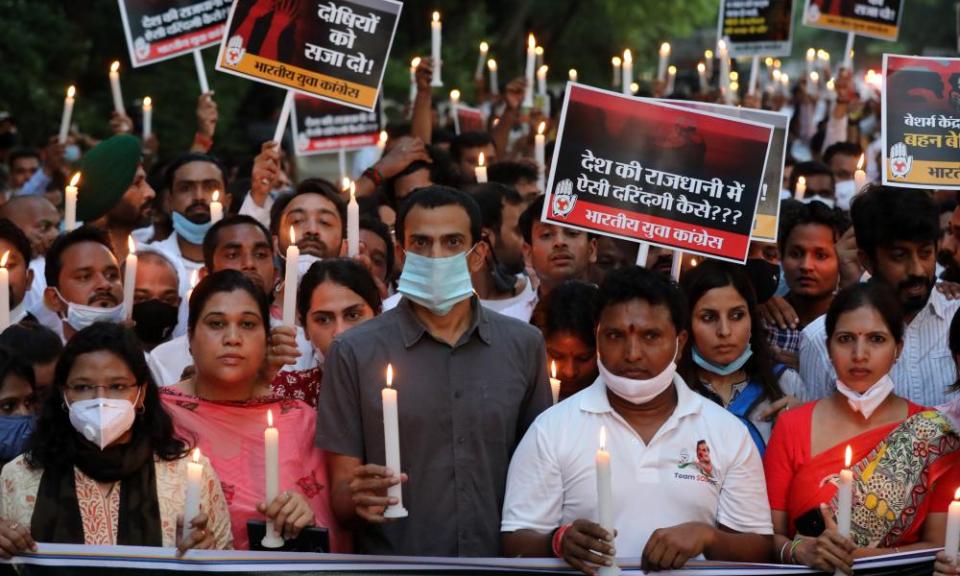Judicial inquiry ordered into alleged rape of nine-year-old girl in Delhi

A judge-led inquiry has been ordered into the alleged rape and murder of a nine-year-old girl in Delhi, as public anger mounts over the Indian government’s silence on the horrific case.
As protests continued for a fourth day amid renewed scrutiny on India’s problem with sexual violence, opposition politicians – including the Congress party’s Rahul Gandhi, who met the girl’s family on Wednesday, and the prominent Dalit politician Mayawati – demanded justice.
Other politicians have demanded action by the home minister, Amit Shah. No ruling party politician or minister has yet made any statement of regret or concern.
Arvind Kejriwal, the head of Delhi’s provincial government who also leads an opposition party, ordered a judicial review of the case. He called for the central government to act on crime. “Top lawyers will be engaged to get the culprits punished,” Kejriwal said on Twitter. “Central government should take strict steps to improve law and order in Delhi, we will cooperate fully.”
Responding to the public mood, the National Commission for Protection of Child Rights has sought a police report within 48 hours. The Delhi Commission for Women has summoned police officers to explain what action they intend to take. Several Bollywood celebrities have vented their disgust on social media.
The gruesome details of the case have appalled Indians, renewing anger and frustration over seemingly unending sexual violence against women.
Police have alleged that the girl, who belongs to a Dalit (low caste) family, was killed after she went to fetch water from a crematorium near her house in the city’s Cantonment area on Sunday. Her family told media the perpetrators cremated her body against their wishes.
Four men had been arrested in connection with the girl’s murder, said Ingit Pratap Singh, the top police officer in the south-west of the capital, where the alleged crime took place. They face charges of murder, rape and criminal intimidation, he added.
The girl’s parents allege that four crematorium workers raped and murdered her.
When the mother saw her daughter’s body, it is alleged the four men claimed she had been accidentally electrocuted near the water tap and warned her not to report the death to the police because an autopsy would lead to doctors stealing her organs.
At first, the mother – shocked and overwhelmed – agreed to their suggestion of an immediate cremation. “They … even got the red cloth to wrap her,” she told local media.
Meanwhile, the mother’s cries were heard and about 200 villagers turned up and, on hearing her say she suspected her daughter had been raped, began to extinguish the pyre.
However, doctors who carried out a postmortem on Tuesday said the fire made it impossible for them to determine the cause of death.
Hundreds of people have protested since the incident, blocking roads and calling for accountability for the death.
The forced cremation has awakened memories of a gang-rape last September in Hathras, Uttar Pradesh, when a Dalit woman, the victim of an assault by upper-caste men, was cremated at night by police without the family’s consent.
Despite much public handwringing over the urgent need to overhaul how the country’s men treat women, observers have voiced dismay that little has changed. One example of this is how some judges, though small in number, continue to believe that a rape complainant marrying the man she accuses is a “solution” to her problems.
Last August, Rajesh Roy, 24, was arrested in Uttarakhand state for raping a young woman. He was allowed out on conditional bail by a court after he agreed to marry his victim. Both families agreed to the marriage as a way of safeguarding their “honour”. In June, he took his wife on a “holiday” to the Himalayan resort town of Nainital and allegedly pushed her off a cliff to her death.
As recently as March, the chief justice of India at that time, Sharad Arvind Bobde, faced calls to resign after asking during a bail hearing whether a man accused of rape would marry the complainant.
As old attitudes remain, the violence continues. About 34,000 rapes were reported in 2018, the last year for which official government statistics were available.
Chandra Shekhar Azad, the head of the Bhim Army Dalit rights organisation, said protests over the girl’s rape and murder would continue until Shah agreed to a “fast track” court to provide swift justice.
“Look at the Hathras case,” he said. “A year later, no one has yet been punished. If this can happen to little girls in the capital of the country, what hope is there for women in the villages?”
Azad’s group held a candlelit vigil at India Gate at 5pm on Wednesday. Apart from speedy punishment, he wants the government to give 1m rupees as compensation and a government job for one member of the family.

 Yahoo News
Yahoo News 